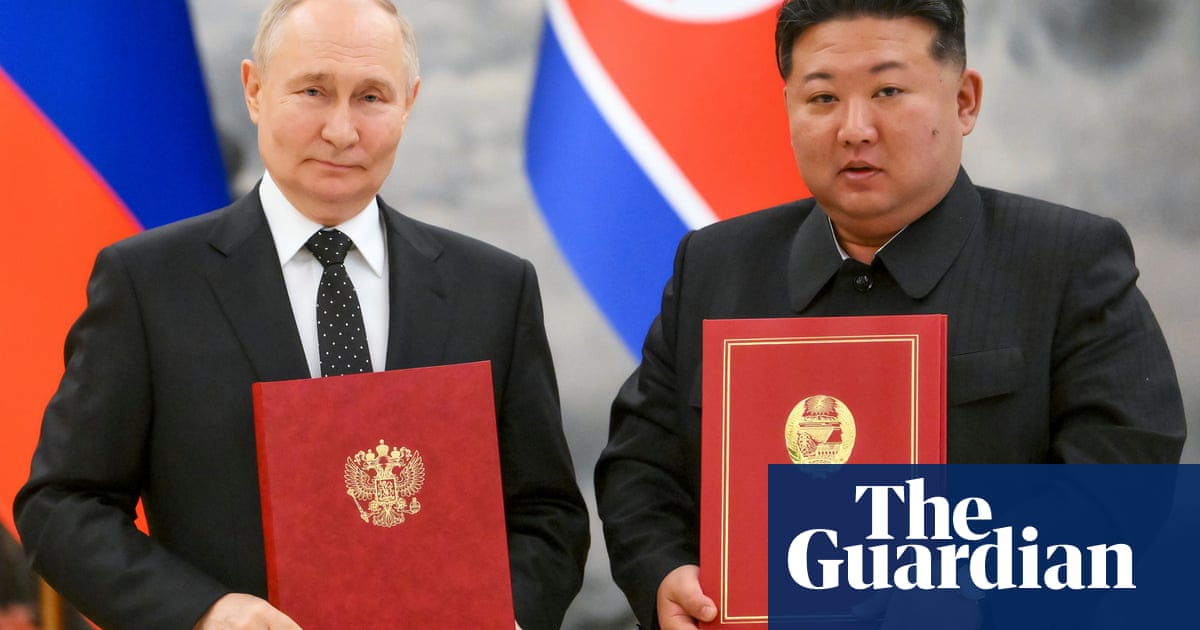Entire population of North Gaza 'at risk of dying'
The UN’s acting humanitarian chief Joyce Msuya has urged Israeli forces to stop what they are doing in northern Gaza, where the entire population “is at risk of dying”.
It has been reported that efforts to clear north Gaza by way of effecting “the generals’ plan” are under way.
This plan is designed to force the remaining population to flee by tightening the siege and cutting off aid. Experts say such tactics amount to war crimes.
Key events Show key events only Please turn on JavaScript to use this feature
Death toll from Israeli attacks on Iran rises to four
Iran’s military has announced the deaths of two additional soldiers following Israel’s attacks on the country, bringing the total death toll to four.
All four men served in the country’s military air defence, it said.

Simon Tisdall
For years, Israel and Iran have waged a “shadow war”, attacking each other indirectly using proxy forces, assassinations, informants, spies and hybrid, non-military covert means.
Now this undeclared, largely silent war is undisguisedly out in the open. It’s become a shooting war, it’s noisy, it’s escalating, and there’s no end in sight.
This is not to say Israel’s large-scale, three-wave air assault on Tehran and other targets inside Iran early on Saturday morning means the two enemies are now engaged in all-out conflict.
This is not yet the full-scale, region-wide conflagration so many in the Middle East fear. That may be coming, but it’s still in the future.
What Israel’s attack – retaliation for Iran’s 181-missile barrage earlier this month – does mean is that another psychological barrier has been passed.
Before the 7 October massacres of Israelis by Iran’s ally Hamas, it was hard to imagine face-to-face military confrontation on each other’s soil. It seemed too risky. Now it is being normalised.
Read the full analysis: Iran-Israel’s shadow war is out in the open and will only escalate unless causes are addressed
Iran’s foreign minister, Abbas Araghchi, said his country was determined to defend itself after Israeli attacks struck military targets in Iran early on Saturday.
In an interview reported by AFP, Araghchi said:
I think we’ve shown that our determination to defend ourselves knows no limits.
The Israeli military has released photos of what it says are Israeli air force planes preparing to launch attacks on Iran overnight.


Hezbollah condemns Israeli strikes on Iran as ‘dangerous escalation’
Hezbollah has condemned Israel’s attack against Iran, calling it a “dangerous escalation in the region”.
The US “bears full responsibility for the massacres, tragedies and pain” caused by Israel, the group said.
UN chief ‘deeply alarmed’ after Israeli attacks on Iran
The UN secretary-general, António Guterres, is “deeply alarmed” by the escalation in the Middle East following attacks overnight by the Israel Defense Forces on Iran, according to a statement from his spokesperson.
“All acts of escalation are condemnable and must stop,” Guterres said in the statement, adding:
The secretary-general urgently reiterates his appeal to all parties to cease all military actions, including in Gaza and Lebanon, exert maximum efforts to prevent an all-out regional war and return to the path of diplomacy.
Biden says he 'hopes this is the end' after Israeli strikes on Iran
Joe Biden, the US president, has said he hopes the Israeli strikes on Iran overnight were “the end”.
Biden also said it appeared that Israel had only struck military targets in its attack on Iran.
Iran has said three sites were hit and that “limited damage” was caused.
Egypt’s flagship airliner has cancelled Saturday flights from Cairo to Baghdad and Erbil in Iraq and Amman, Jordan.
EgyptAir blamed the cancellations on “the ongoing developments in the region”.
Israeli attacks killed 19 in Lebanon on Friday, says health ministry
Lebanon’s health ministry said Israeli attacks killed 19 people in the country on Friday, bringing the total death toll to 2,653 since October 2023.
Summary of the day so far
It’s just after 6.30pm in Tehran and 6pm in Tel Aviv. Here’s a roundup of the latest developments:
Two soldiers were killed in Saturday morning’s Israeli airstrikes on Iran, according to the official news agency IRNA. The attacks, carried out in retaliation to the missile barrage launched by Iran on 1 October, were heard over several hours in Tehran, the capital, and at nearby military bases.
The UK and US are among the nations to have warned against further escalation alongside the EU. Iraq, Saudi Arabia, Qatar, Egypt, the United Arab Emirates and Pakistan have all condemned the attacks.
Iran’s foreign ministry has defended its right to “defend itself against external aggressive acts”. The ministry called the Israeli attack a violation of international law, adding that Tehran “recognises its responsibilities towards regional peace and security”.
The internal debate on how Iran should respond turns on whether to treat Israel’s actions as too grave to be ignored, or to elect not to launch reprisals on the basis of advice coming from the region and from the US.
Hezbollah has fired rockets at Israeli soldiers on the outskirts of Lebanon village Aita al-Shaab, and has also launched drones against an Israeli air base south of Tel Aviv. The “aerial attack with drones” against the Tel Nof base was the first claim of its kind in one year.
Hezbollah also fired rockets at five residential areas in northern Israel on Saturday, including the outskirts of Krayot near Haifa. Elsewhere the Israeli military has said that it killed a Hamas militant during a raid in the West Bank on Saturday.
Israeli forces have withdrawn from a hospital complex in northern Gaza one day after storming it. Medics said at least 44 of the 70-member team at the Kamal Adwan hospital in Jabalia had been detained by the army, with 14 later released.

 3 weeks ago
3 weeks ago


















